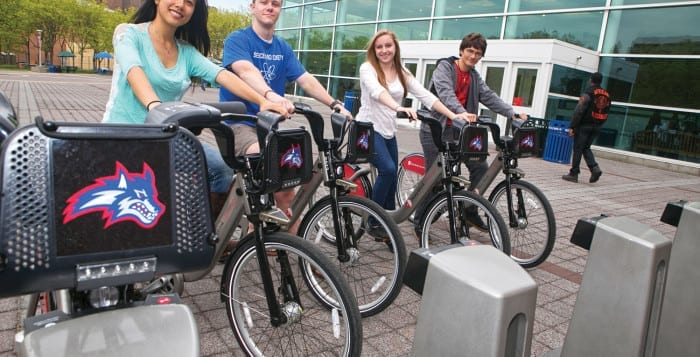Building a green campus for a sustainable future
By Greg Monaco
Stony Brook University’s Seawolves may sport the color red, but our campus is getting “greener” every day.
The University is devoted to creating a more environmentally friendly campus by learning and implementing new sustainable practices, a mission sparked in 2007, when Stony Brook signed the American College & University Presidents’ Climate Commitment. Since then, they’ve made major strides by improving transportation, planting and energy-usage efforts.
These efforts put Stony Brook University on The Princeton Review’s Green Honor Roll, a recognition given to only 24 schools. The Princeton Review also ranked Stony Brook No. 4 in its “Top 50 Green Colleges of 2015,” making this the sixth consecutive year The Princeton Review recognized the University.
In April 2013, the University unveiled its state-of-the-art SBU Wolf Ride Bike Share system to provide a zero-emission commuting option on campus. Originally consisting of four solar-powered stations and 48 bicycles, the program has grown to eight stations and 63 bikes, and students have enjoyed more than 14,000 rides.
To encourage the use of alternatively fueled vehicles, the University installed 10 electric vehicle charging stations on campus. To date, more than 700 cars have been charged with a total output of 2.596 MW.
The National Arbor Day Foundation named Stony Brook University a Tree Campus USA recipient in 2013 and 2014, recognizing our dedication to campus forestry management and environmental stewardship. The University boasts a robust planting program, designed to beautify the campus and engage students, faculty and staff in learning sustainable planting techniques during the Office of Sustainability’s hands-on Growing Red Days.
The University is committed to reducing its energy usage by undergoing a large, interior-lighting retrofit, encompassing more than 35 academic buildings. The project as a whole will replace more than 55,000 interior light fixtures with new energy-efficient lamps.
With the help of students, faculty and staff, Stony Brook University will continue to develop a more eco-friendly environment, serving an ongoing goal of securing a sustainable future for the university campus, the community and the world.
Greg Monaco is the Sustainability Coordinator at Stony Brook University.







